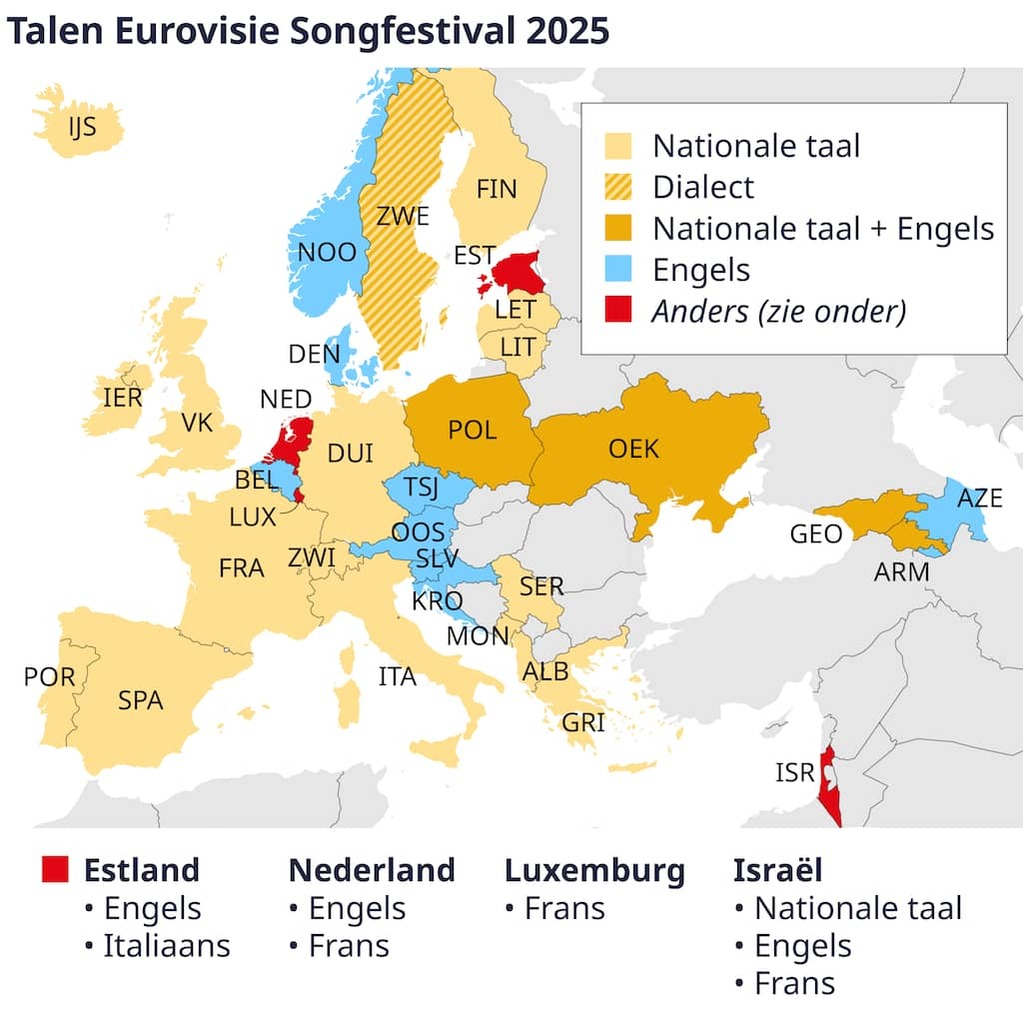
Oud-Slavian, Lithuania, Lets and Albanian: You can hear it all this song festival. 24 of the 37 participating countries (partly) do not sing in English. That’s a record. Since 1999 there were not so many different languages to be heard at the Eurovision Song Contest.
It is a common complaint every year: if everyone sings in English, we don’t learn anything about each other’s cultures? Should the Songfestival not just have the rule that every country sings in its own language?
But anyone who really follows the Songfestival knows that there has been an emerging trend for years: leave English for what it is and simply sing in your native language again. Since 2018, singing in the national language has been on the rise. The fear that people don’t understand songs because they don’t understand the text is a bit over.
This year, 65 percent of countries do not sing in English, as you can see on the map below. Last year that was just less than half of the participants. That difference is largely due to the Big Five. These are the countries that are automatically through to the final every year because they are large lenders: France, Italy, Spain, Germany and the United Kingdom. This year they all sing in their own language for the first time since 1998.
Germany did not dare for years. In 2007, 2001 and 2000 the country sang in German, but also in English. That Abor & Tynna sing their baller completely in German is really a trend break for the country.

Italy actually always sings in its own language, Sweden not for 27 years
Some countries are very tied to their own language. For example, Italy has never sung non-Italian. Although the country combined it five times with English and the entry sang Napolitan in 1990, but there is still a discussion whether that is really a loose language, or rather a dialect. Singer Lucio Corsi has chosen to subtitle his entire act in English this year.
Claude regularly sings in Dutch, but chose to perform this Songfestival in English and French. That fits a bit in line with Dutch entries: of the 64 times we participated, we sang 41 times in Dutch. But in the last fifteen years that was only three times.
Sweden has not sung Swedish since 1998: the country won four times with an English song in those 27 years. Yet the Kaj group breaks with tradition and sings Swedish this year. Special, because the three men themselves are Finnish.
“Apparently three Finns were needed to have Swedish return at the Songfestival. We are honored, because it is a wonderful language. And we also sing in Vora, a dialect that not many people speak, but is what Europe needs,” says singer Jakob Norrgard in conversation with NU.nl.
Singing in a language other than English: it works
And it works, it turns out when you look at the winners of the last ten editions. Singing in a language other than English is really on the rise. Three times a song won that was non-English. While in the ten years before, only a non-English song won once.
This edition is also skilling English in viewers: fifteen countries participated in the first semifinal. Of these, seven do not sang in English and eight does. The seven that sang in a different language are all through, of the other eight only three. This year, people at home are happy to vote for a glimpse into the culture of another country.
Looking at the potential winners According to the betting offices you can also see it: in the top ten there are now six countries that (partly) skip English in their song. Maybe Claude with C’est La Vie has found exactly the right mix and still wins?
Old Slavic, Lithuanian, Latvian, and Albanian: You can hear it all at this Eurovision Song Contest. 24 of the 37 Participating Countries Sing (Partly) Not in English. That is a record. Since 1999, there have not leg so many different language to be heard at the Eurovision Song Contest.
It is a frequently heard complaint every year: Ifyone sings in English, don’t we learn anything about Each Other’s cultures? Shouldn’t the Eurovision Song Contest Simply Have the Rule that every country sings in its own Language?
But anyone who really follows the Eurovision Song contest knows that there has been an emerging trend for years: Leaving English for what it is and simply singing in your native language again again. Singing in the National Language Has Been on the Rise Since 2018. The Fear That People won understand songs because Don’t Understand The Lyrics is fading a bit.
This year, 65 percent of the country’s do not sing in English, as you can see on the map below. Last year, it was slightly less than half of the participants. That Difference is Largely Due to the Big Five. These are the Countries That Automatically Advance to the Final Every Year because they are major financiers: France, Italy, Spain, Germany, and the United Kingdom. This year, for the first time since 1998, they are all singing in their own language.
Germany did not dare to do it for years. In 2007, 2001 and 2000, The Country Sang in German, but also in English. The Fact That Abor & Tynna Sing Their Baller Entirely in German is Therefore a Real Break With Tradition for the Country.

Italy Always Sings in its own Language, Sweden Hasn’t for 27 years
Some Countries Are Very Attached to Their Own Language. For Example, Italy Has Never Sung Non-Italian. Althegh the Country Did Combine IT Five Times with English and Sang the Entry in Neapolitan in 1990, there is Still a Debate as to Whether That Is Really a Separate Language, or Rather A Dialect. Singer Lucio Corsi Has Chosen to Subtitle His Entire Act in English This Year.
Claude Regularly Sings in Dutch, But Chose to Perform in English and French at this Eurovision Song Contest. That fits a bit with the line of dutch entries: or the 64 times we participate, we sang 41 times in Dutch. But in the last fifteen years that was only three times.
Sweden not Sung Swedish Since 1998: The Country won Four Times in Those 27 years with an English-Language Song. However, The Group Kaj is Breaking With Tradition and Sing Swedish This Year. Special, because the three men are Finnish Themselves.
“Apparently It Tok Three Finns to Bring Swedish Back to the Eurovision Song Contest. We are Honored, Because It Is A Beautiful Language. And we also Sing in Vora, A Dialect That Not Many People Speak, but what Europe Wits,” Says Says Says.
Singing in A Language Other than English: It Works
And it works, as you can see when you look at the winners of the past editions. Singing in a language other than English is really on the rise. Three Times a Song That was not English won. While in the ten years before that only one non-English language song won.
Skipping English is also popular with viewers this edition: Fifteen Countries Partipated in the First Semi-Final. Or thesis, seven sang not in English and Eight Did. The seven who sang in Another Language All Got Through, of the Other Eight Only Three. People at Home Are Therefore Happy to Vote This Year for a Glimpse Into the Culture of Another Country.
Looking at the potential winners Accordination to the bookmakers you also see it: in the top ten are now six Countries that (partly) skip English in their song. Maybe Claude With C’est La Vie Has Found Exactly the Right Mix and Still Wins?